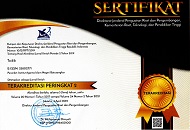The Development of Project-Based E-Learning Tool to Improve Students' Creative Thinking Skill
Abstract
This study aimed to determine the form, the level of effectiveness, and the obstacles and challenge in developing project-based e-learning tool to improve students’ creative thinking skills. The learning media developed are syllabus, lesson plans, modules, and creative thinking skills test. The model which is developed is the Plomp model which consists of some phases namely investigation, design, realization/construction phases and the evaluation, revision, test phase. Based on the validation test, the syllabus was 4.48, the RPS was 4.48, the module was 4.36, and the THB was valid. Based on the practicality test, the students’ responses were 76.25% and the lecturers’ responses were 4.70 and the category is very good. Based on the individual effectiveness test of 43.8% > 5%, classical completeness z count = 0.976 is between the z table and the N-gain test, 2 students had increasing creative thinking ability test scores in the high category, 6 students were in the medium category. Then it can be concluded that the learning tools developed are valid, effective, and practical.
Keywords
Full Text:
PDFReferences
A. Gunasekaran, Mcneil, R. D., & Shaul, D. (2002). E-Learning:Research and Applications. Industrial and Commercial Training, 34(2), 44–53. https://doi.org/10.1108/00197850210417528
Abroto, Prastowo, A., & Anantama, R. (2021). Analisis Hambatan Proses Pembelajaran Daring dengan Menggunakan APlikasi Whatsapp di Sekolah Dasar. Jurnal Basicedu, 5(3), 1632–1638.
Antika, R. N., & Nawawi, S. (2017). The Effect of Project Based Learning Model in Seminar Course to Student’s Creative Thinking Skills. Jurnal Pendidikan Biologi Indonesia, 3(1), 72. https://doi.org/10.22219/jpbi.v3i1.3905
Arisanti, W. O. L., Sopandi, W., & Widodo, A. (2016). Analisis Penguasaan Konsep Dan Ketrampilan Berpikir Kreatif SIsa SD Melalui Project Based Learning. EduHumaniora: Jurnal Pendidikan Dasar, 8(1), 82–95.
Bell, S. (2010). Project-Based Learning for the 21st Century: Skills for the Future. The Clearing House: A Journal of Educational Strategies, Issues and Ideas, 83(2), 39–43. https://doi.org/10.1080/00098650903505415
Fatmawati, M. B. (2011). Pembelajaran Berbasis Proyek Untuk Meningkatkan Keterampilan Berpikir Kreatif Mahasiswa. Jurnal Pengajaran Matematika Dan Ilmu Pengetahuan Alam, 16(2), 85. https://doi.org/10.18269/jpmipa.v16i2.224
Fitriani, W., Komalasari, E., Adzhani, M., & Nelisma, Y. (2022). Development of Research-Based Modules in Educational Psychology Lectures to Improve Creativity. 6(4), 603–615. https://doi.org/10.31004/obsesi.v6i4.2314
Hakim, A. R. (2018). Pengembangan E-Learning Berbasis Moodle Sebagai Media Pengelolaan Pembelajaran. Kodifikasia, 12(2), 167–183.
Husamah. (2015). Thinking Skills for Environmental Sustainability Perspective of New Students of Biology Education Department Through Blended Project Based Learning Model. Jurnal Pendidikan IPA Indonesia, 4(2), 110–119. https://doi.org/10.15294/jpii.v4i2.3878
Huzaimah, P. Z., & Risma, A. (2021). Hambatan yang dialami siswa dalam pembelajaran daring matematika pada masa pandemi covid-19. Jurnal Cendekia: Jurnal Pendidikan Matematika, 05(01), 533–541.
Ibda, H. (2018). Penguatan Literasi Baru Pada Guru Madrasah Ibtidaiyah dalam Menjawab Tantangan Era Revolusi Industri 4.0. JRTIE:Journal of Research and Thought of Islamic Education, 1(1), 1–21.
Isabekov, A., & Sadyrova, G. (2017). Project Based Learning to Develop Creative Abilities in Student. In Technical and Vocational Education and Training (Vol. 28). https://doi.org/10.1007/978-3-319-73093-6_12
Izzati, N. (2014). Pengaruh Penerapan Model Mahasiswa. EduMa, 3(1), 77–91.
Khairat, A., & Fuaddin, I. (2019). The Use of E-Learning by Teachers in Teaching and Learning Process. PROCEEDING IAIN Batusangkar, 3(1), 45-50.
Kivunja, C. (2015). Teaching Students to Learn and to Work Well with 21 st Century Skills : Unpacking the Career and Life Skills Domain of the New Learning Paradigm. International Journal of Higher Education, 4(1), 1–11. https://doi.org/10.5430/ijhe.v4n1p1
Kokotsaki, D., Menzies, V., & Wiggins, A. (2016). Project Based Learning: A Review of the Literature. Durham Research Online, 19(3), 267–277.
Mustika, D., & Ain, S. Q. (2020). Peningkatan Kreativitas Mahasiswa Menggunakan Model Project Based Learning dalam Pembuatan Media IPA Berbentuk Pop Up Book. Jurnal Basicedu, 4(4), 1167–1175. https://doi.org/10.31004/basicedu.v4i4.518
Priatmoko, S. (2018). Memperkuat Eksistensi Pendidikan Islam di Era 4.0. TA’LIM, 1(2), 1–19.
Sadikin, A., & Hamidah, A. (2020). Pembelajaran Daring di Tengah Wabah Covid-19. Biodik, 6(2), 214–224. https://doi.org/10.22437/bio.v6i2.9759
Sari, S. P., Manzilatusifa, U., & Handoko, S. (2019). Penerapan Model Project Based Learning (PjBL) Untuk Meningkatkan Kemampuan Berfikir Kreatif Peserta Didik. Jurnal Pendidikan Dan Pembelajaran Ekonomi Akuntansi, 5(2), 119–131.
Sholichin, M., Zulyusri, Z., Lufri, L., & Razak, A. (2020). Analisis Kendala Pembelajaran Online Selama Pandemi Covid-19 Pada Mata Pelajaran IPA di SMPN 1 Bayung Lencir. Biodik, 7(2), 163–168. https://doi.org/10.22437/bio.v7i2.12926
Shute, V., & Towle, B. (2003). Adaptive E-Learning. Educational Psychologist, 38(2), 105–114.
Situmorang, A. S. (2016). berdasarkan hasil analisis varians (ANAVA) untuk uji keberartian regresi pada taraf signifikansi 5% (α=0,05) diperoleh F. Jurnal Suluh Pendidikan FKIP-UHN, 3(1), 12–22.
Zakiah, N. E., & Fajriadi, D. (2020). Management of Authentic Assessment in Mathematics Lessons to Develop 4C skills. Journal of Physics: Conference Series, 1613(1), 1–6. https://doi.org/10.1088/1742-6596/1613/1/012050
Zakiah, Nur Eva, Fatimah, A. T., & Sunaryo, Y. (2020). Implementasi Project-Based Learning untuk Mengeksplorasi Kreativitas dan Kemampuan Berpikir Kreatif Matematis Mahasiswa. Teorema, 5(2), 285–293.
DOI: http://dx.doi.org/10.31958/jt.v25i1.5699
Refbacks
- There are currently no refbacks.
Copyright (c) 2022 Nurul Qomariyah Ahmad

This work is licensed under a Creative Commons Attribution-NonCommercial 4.0 International License.
TA'DIB with registered number e-ISSN: 2580-2771, p-ISSN: 1410-8208 have been indexed on:

Journal Ta'dib distribute under Lisensi Creative Commons Atribusi-NonKomersial 4.0 Internasional.
Contact us: Ta'dib; Address: FTIK, Universitas Islam Negeri Mahmud Yunus Batusangkar; Jl. Sudirman No. 137 Lima Kaum Batusangkar, Tanah Datar, Sumatera Barat, Indonesia. Email: takdib@uinmybatusangkar.ac.id

























